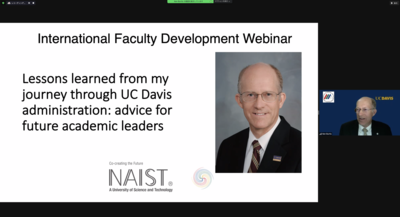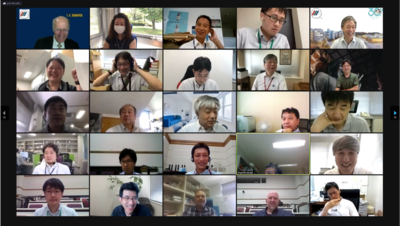International Faculty Development Webinar "Lessons learned from my journey through UC Davis administration: advice for future academic leaders at NAIST" (2021/08/04)
"Co-creating the future" is an important theme of President Shiozaki's Vision 2030, announced in April 2021. As an essential characteristic of this co-creation is the participation of all stakeholders in planning for the future of the institution, including those who may eventually take on formal roles in university administration, the Institute of Educational Initiatives invited Dr. Kenneth C. Burtis (Professor Emeritus of Genetics, Faculty Advisor to the Chancellor and Provost, University of California, Davis) as a lecturer for the International FD Webinar.
In the first session of the webinar, Dr. Burtis introduced the lessons about leadership he learned over the course of his career at UC Davis. Over the past decade, Dr. Burtis worked to guide the planning of campus growth and the development of the current strategic plan for UC Davis. Dr. Burtis stressed "putting students first - we should have the primary focus on our students and their progress", "everyone should be involved in the discussion on university administration regardless of age or position, and an important thing is to find every stakeholder's strengths to benefit the university", "you can objectively recognize the weakness of your university from outside for example by leaving the university(sabbatical)", and " the main role of top administrative positions is to serve students and faculty, top management should find "vicarious enjoyment" in the growth and progress of the whole university."
In the second session, all participants went through an exercise in generating ideas and opinions to formulate a strategic plan, which was one of the tools used at UC Davis to ensure a wide involvement of stakeholders. 24 participants were divided into 4 groups and interviewed each other to exchange opinions and ideas about four questions that were prepared according to four parts of the NAIST President's Vision. To conclude the seminar, a representative of each group reported the opinions and ideas generated for each question and shared them among all participants.
This webinar attracted a wide range of participation, from the university administration management to faculty and staff. Participants gave positive feedback about the webinar saying "it was a good opportunity to exchange views with university members with whom there is usually less communication," "I found it very efficient to generate opinions and ideas by dividing participants into small groups," "I learned the importance of wide participation and getting to know each other," and "it must be an effective approach to create opportunities to discuss specific themes with equal participation of students, faculty and staff."


Lecture by Dr. Burtis
